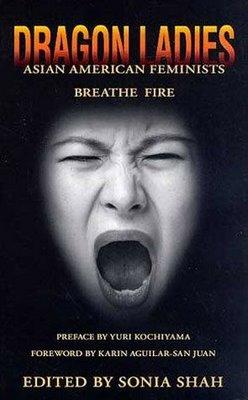Dragon Ladies: Asian American Feminists Breathe Fire

Incredible. Insightful. Inspiring. These are the words I use to describe Dragon Ladies: Asian American Feminists Breathe Fire, the pivotal textbook on the growing politics of Asian American women. Essays embrace wide-ranging issues that include domestic violence, health, exploitation in the global trade, the role of spirituality, and punk-rock culture—all in the light of organizing and activism.
The anthology’s key concern is with the attitude of mainstream feminism whose individualistic and essentialist views are at odds with the affairs and experiences of Asian women. Sonia Shah, editor of Dragon Ladies, believes that a singular Asian American feminist movement is essential in representing Asian American women’s interests. The term ‘Asian’ is problematic in that it corresponds to a diaspora of ethnic identities, but Shah nevertheless manages to take into account the realities that females face from this walk of life.
As Juliana Pegues points out in “Strategies from the Field,” unlike white activists, Asian women have to deal with invisibility as well as “exotic” racial stereotypes and labels like “well-behaved,” “hard-working.” and “obedient.” The trouble is that Asian women’s perspectives are ignored when race is viewed in terms of black and white. When it comes to organizing resistance, “groups in many cases act as all-white groups internally, and white perspectives and standards are the norm.”
Purvi Shah’s article “Redefining the Home” is very engrossing, though the entire text is by no means an easy read. In fact, a lot of the material is tough, but if you’re passionate enough about this topic, you’ll fly through it. Shah discusses the belief that the personal is political when it comes to abuse within the home. Community elites seem to be the culprits in seeding the idea that culture and politics are separate issues—matters of the Home/Marriage for instance are cleverly disguised as tradition; these leaders are in essence threatened by organizations that challenge their norms. Rightly so, Shah proposes that “a home in which violence occurs is a public space” and a political problem that is affected by a range of factors like social, cultural and environmental.
Many prominent figures have come together to comprise this collection of interviews, personal essays, and eye-opening historical and current facts such as on the slave-like treatments of overseas Filipina workers. The joint mother-daughter article “Bringing Up Baby: Raising a ‘Third World’ Daughter in the ‘First World’” was a piece I found quite amusing and relevant to my own view of reality. Shamita Das Dasgupta and Sayantani DasGupta talk about balancing their different identities—Indian immigrant and American-born Indian—against Western culture. The idea of community is important to Indian culture and therefore for Indian women, it forms part of their identity; adopting the model of western feminism whose emphasis lies on the ‘individual’ would inevitably further alienate them; the issues concerning white feminists do not always apply to women of Asian origin.
Dragon Ladies: Asian American Feminists Breathe Fire in itself deconstructs the Asian woman stereotype conveying instead an image of the “virangana”—the ‘warrior woman’ thirsting to battle for change and victory. The contributors are good role models to rouse the next generation to self-reflect and take part in some form of action to empower the disadvantaged. From a spiritual standpoint, Cheng Imm Tan makes an important assertion: “When activism is fuelled by anger and hatred, we end up objectifying the ‘enemy’ just as we have been objectived.” What Tan then subtly suggests is that injustice can be met with compassion, and an intent to transform our aggressors rather than destroy them.
Certainly, this is a book with great ideas from women who not only breathe fire but speak with absolute conviction.
Great review. Sounds like a worthwhile read.